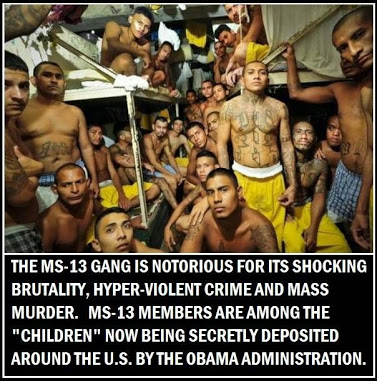
Propaganda is to democracy, Noam Chomsky once noted, what violence is to totalitarianism.
Repeated often enough, manipulative messages dissolve critical analysis.
Orwell knew this. Huxley knew this. Hitler knew this.
Yet, for all of their good intentions, immigrant advocates have not sufficiently engaged in this battle.
Many of my immigration reform colleagues scoff at their opponents’ repulsive messages, such as the one above, as being simplistic and ridiculous.
They’re right.
However, they underestimate the force of these messages.
That’s a grave error.
A Battle For The Hearts And Souls Of The American Public
Immigration reform rests upon winning the hearts and souls of the American public, not merely a few electoral victories.
Without a concerted effort against the crude imagery and misleading innuendo utilized by opponents, the odds of achieving compassionate, if not comprehensive, immigration reform in our lifetimes is slim.
Let me repeat myself.
Immigration reform rests upon winning the hearts and souls of the American public.
As advocates, we cannot overlook the role of social perversion.
I learned, during my years on the inside, all political battles are waged on a subconscious level before they are started on the level of public consciousness. The fight for immigration reform is not different.

Fighting propaganda is no small matter.
It is the sine qua non of political victory.
Immigration Propaganda With A Political Purpose
A few days ago, I was browsing the internet, looking for insights on the Central American Refugee Crisis.
Being an immigration attorney in Riverside, I was searching for information to help my Murrieta, California clients and friends rebut their xenophobic neighbors’ false perceptions.
The images, shown above, popped up in my stream.
I paused. I reflected.
Simplistic? Yes.
Ridiculous? Yes.
Repulsive? Yes.
But most likely effective.
Clearly, the messages were not intended for my friends.
Nor, in my view, were they primarily aimed at hard core racists who already despise immigrants.
These are points missed by most of my reform colleagues.
Rather, these messages are aimed at another crowd, individuals whose reservations about immigrants and their families have softened in recent months.
With a small psychological push, immigrant opponents hope to sway them to step away from their creeping support for reform legislation.
The goal is to bring them again into the anti-immigrant fold.
Will The Refugee Crisis Set Immigration Reform Back?
Political campaign strategists have long understood the incredible value of triggering events.
They open the floodgate for unbridled emotions. The side which masters this wave controls the next round of debate.
The Central American Refugee Crisis is one such event.
It has the potential to throw the reform movement back several years. The momentum, built over the course of the past eight years, for pathways to legal residency and citizenship now hangs in the balance.
Several allies suggest my position is unwarranted.
I’m sticking to my guns. They’re wrong.
Take the 1960s. Scholars have noted Martin Luther King’s genius for hitching the civil rights struggle to the anti-Vietnam War movement, two seemingly unrelated social issues.
Along this line of thought, look again at the images above.
One focuses on terrorism. Many Middle Americans still live in fear of terrorism. Will another 7/11, they fret, take place on domestic soil?
The second image addresses a different set of worries for U.S. citizens, left and right. Gangs, drugs, and violent crime remain central to local, state, and often federal political campaigns, which means these issues are very much on the minds of the body politic.
The images have a common denominator. They link a cause, fighting terrorism in one and crime in another, to a triggering event, the Central American influx, and to a seemingly unrelated cause, eliminating illegal immigration.
This is propaganda at its best – or worst – depending on your perspective.
The images, however, are more than just images.
They are part and parcel of a grander scheme.
Modern Propaganda And Immigration Mythology
A few days after my discoveries, Sally Kohn, writing at CNN.com, discussed how the I-word is Un-American. She noted:
Today, opponents of immigration reform attack undocumented immigrants as “illegal immigrants.” Even worse, like anti-immigration extremists, some prominent elected officials use the term “illegals.” Maine Gov. Paul LePage, a Republican, said, “I urge all Mainers to tell your city councilors and selectmen to stop handing out your money to illegals.”
Is it not possible to oppose immigrant rights without resorting to attacking immigrants as human beings? The intensity of the anti-immigrant rhetoric is stunning. Even if you don’t support a path to citizenship for undocumented immigrants, can’t you find some compassion for them as human beings who live on the same planet?
Of course, it is possible to oppose immigration reform without attacking immigrants as human beings.
But why would anti-reform propagandists extend such courtesy?
In their world view, all is fair in love, war, and immigration politics.
Hitting below the belt may not be morally right, but it is politically effective.
False labels about immigrants subtly condition the minds of less informed citizens.
Countless individuals have fallen for this type of rhetoric. The contorted terminology and imagery have become part of the national immigration reform debate, despite its mean-spirited nature.
Moreover, as Herbert Shelton, an expert on healthful living, once wrote, “It is always a much easier task to educate uneducated people than to re-educate the mis-educated.”
The task for immigrant advocates, then, is not to plead for mercy, but to fight fire with fire.
Like our opponents, we must educate the uneducated.
Why Reformers Must Avoid The Temptation To Minimize The Effects Of Ridiculous Propaganda
A few days later, a Fox News Latino report confirmed my sense of urgency.
Residents in northwestern South Carolina say they found bags of candy on their street containing a piece of paper asking them to join the Ku Klux Klan. The paper not only had the slogan but also included a phone number that led to an automated message discussing KKK efforts against illegal immigration.
When someone dials the “Klan Hotline” printed on the paper, according to FOX Carolina, a voicemail message picks up saying: “Be a man, join the Klan! Illegal immigration is destroying America.” Then it addresses immigration concerns and ends with, “Always remember: if it ain’t white, it ain’t right. White power.”
Simplistic? Yes.
Ridiculous? Yes.
Repulsive? Yes.
But likely effective.
Towards A Plan Of Countervailing Action
No less an expert than George Orwell tried to warn us that “if thought corrupts language, language can also corrupt thought.”
Illegals?
Anchor babies?
Amnesty?
It is not enough, as immigrant advocates, to simply look at the above images and recoil in disgust. It is not enough to merely feel personally wounded and ethically violated.
We must do more.
These images are major examples why immigration reform stalled, and is now in danger of being set back another ten years.
We must forcibly and dramatically stand our ground.
In my view, immigrant activists have not focused ample energy and efforts to winning the hearts and minds of lukewarm supporters and lukewarm non-supporters.
Out of political necessity, advocates have targeted strategies to motivate the immigrant community to battle for their own hopes and dreams. Measures like the use of hashtags have been effective to reinforce the unity of immigrants and to inspire them to stand firm against excessive deportation and detention policies.
Likewise, attempts to attract heightened compassion and sympathy for the plight of young children from Honduras, Guatemala, and El Salvador and to develop legal strategies to ensure the protection of their due process rights are necessary actions which must be taken.
Even so, something more is needed to reach the Middle America not already on our side.
This does not mean engaging in the same types of attacks as our opponents. As I have written before, fighting hate with hate is not the answer.
Nonetheless, force can and must be met with countervailing force.
It is essential to neutralize these false messages here and now. We must nip the rebirth of nativist propaganda before it spreads once more like wildfire throughout a less-than-politically-astute American public.
The truth, unfortunately, is that propaganda works.
Perhaps advocates should organize a national day of protest against hate. The spotlight could be on calling Middle America’s attention to the distorted half-truths of our opponents’ propagandized messages and imagery.
We must convince Middle America forcibly and dramatically that real Americans do not believe in hate towards human beings from other cultures.
Some colleagues suggest I am overreacting.
Maybe.
I doubt it.
The goal of modern anti-immigrant propaganda, after all, is not only to transform political opinion, but also to mutate social belief into a mythological mindset that immigrants are undesirable human beings.
By Carlos Batara, Immigration Law, Policy, And Politics




